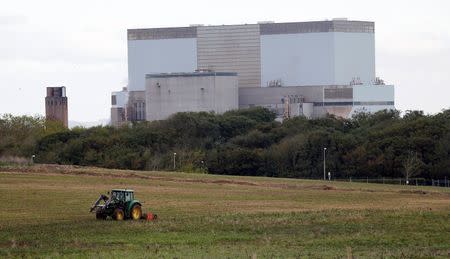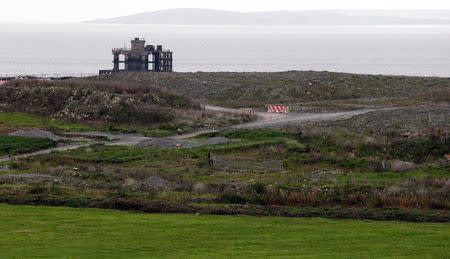Britain casts doubt on EDF's $24 billion nuclear project
By Nina Chestney and William Schomberg LONDON (Reuters) - Britain has cast doubt on a $24 billion (18 billion pounds) project with French utility EDF to build the UK's first new nuclear plant in decades, delaying a final decision on the plan just weeks after the Brexit vote ushered in a new prime minister. The surprise decision to review the Hinkley Point C project was made public hours after the board of French state-controlled EDF voted to proceed with it. The British government, which had been expected to sign contracts on Friday, said instead that it wanted to give the plans further consideration, postponing its verdict until early autumn. The review came little more than a month after Britons voted to leave the EU in a referendum that forced the resignation of Prime Minister David Cameron - whose administration gave the initial go-ahead to the project - and the accession of Theresa May. The vote, and the resulting economic uncertainty, threw doubt on the future of major British infrastructure projects, including the nuclear plant. The two new reactors at Hinkley Point, in south-west England, would provide around 7 percent of Britain's electricity, helping to fill a supply gap as the country's coal plants are set to close by 2025. The pouring of the first concrete is scheduled for mid-2019 but the plant's start-up date has been delayed several times due to regulatory hurdles, the fallout from the Fukushima nuclear disaster in Japan and EDF's deteriorating financial position. Analysts and unions said the review under new Prime Minister May would likely delay the project further. EDF's Chief Executive Jean-Bernard Levy said on Friday that the company had not been given advance warning of the review but that it was ready to organise the signing of contracts "as soon as all the parties involved are ready". OVERPAYING? Although EDF and Chinese partner China General Nuclear are responsible for the 18-billion-pound ($24 billion) cost of the project, Britain has committed to pay a minimum price for the power generated by the plant for 35 years. Critics, including some British lawmakers and academics, say the country would be overpaying at that minimum price, which equates to double current market levels. "Because of the fall in the energy price over the past 12 months, the project does look very expensive and there have been a lot of calls for other projects to be considered or for this to be taken back to the drawing board," said Oliver Salvesen, analyst at investment bank Jefferies. "It probably still would go ahead but it does cast some additional doubt on whether (the government) will look for alternatives in the meantime," he added. Tooraj Jamasb, chair in energy economics at Durham University Business School, said having a new leader and cabinet in place offered Britain an opportunity to revisit the merits of the project while being less bound to the commitments of the previous leadership. "It is also possible that the government may want to use the project as a card in its post-Brexit negotiation to soften the French stance on trade deals," he added. EDF's Levy said he had no comment to make about the possible renegotiation of the contract. The British review could nevertheless lead to increased resistance in France to the project, which was only narrowly approved by the EDF board on Thursday. The plans led to the resignation of a board member who said they were financially risky, echoing the criticism of French unions which say the project is too big for EDF and jeopardises the survival of the company. CONCERNS RAISED A government spokeswoman told Reuters on Friday it was "only right" the new administration looked at all details of the project before making a decision. Britain and EDF first reached a broad commercial agreement on the project in 2013. Potential security risks have also been cited as a concern about the project in some quarters. Last year, Nick Timothy, who worked closely with May in the past and is now her joint chief of staff, raised concerns about Chinese investment in Hinkley. Timothy said security experts were worried the state-owned Chinese group, which owns a stake of about a third in the project, would have access to computer systems that would allow it to shut down Britain's energy production. If the project goes ahead after the government's review, the plant would not come online until the 2030s, industry experts estimate. EDF will still have to shoulder the costs of the long construction phase during which the investment will not generate any cash flow, which is credit negative for the firm, said Paul Marty, vice president and senior credit officer at Moody’s. Opponents of the project in Britain say the price at which the government has agreed to buy power from EDF is too high. The government signed a 35-year electricity price guarantee contract, known as a "contract for difference", with EDF in October 2013, under which the utility will receive a top-up fee if power prices are below 92.50 pounds per megawatt-hour. Current baseload power prices in Britain are under 40 pounds per megawatt-hour. "The 92.50 price in the contract was in 2012 money. The contract obviously hasn't been signed. If they were to change that price they would have to do an entirely new contract or plan for the project which would then be delayed a lot further," Jefferies' Salvesen said. (Additional reporting by Kylie MacLellan in London and Geert de Clercq in Paris; Editing by Pravin Char)

 Yahoo News
Yahoo News 


